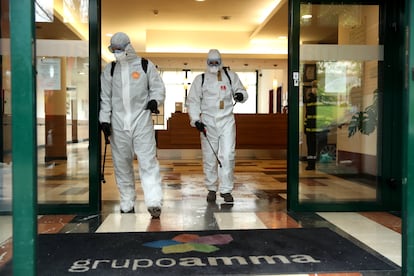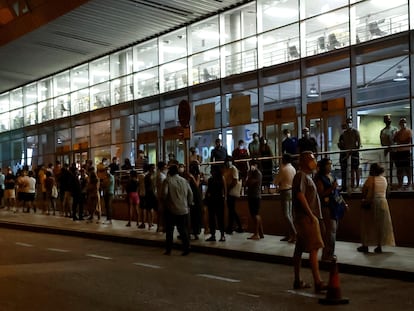Spain drafts legal reform allowing state to mobilize all adults in times of crisis
The changes to the National Security Law, which incorporates lessons from the coronavirus pandemic, would also let the government requisition private assets and suspend activity


All adults will be required to provide “personal services” to the state if a crisis is ever declared in Spain, according to the reform of the National Security Law being prepared by the government.
The draft legislation – which incorporates lessons learned during the coronavirus pandemic – indicates that all citizens, without exception, must follow the orders and instructions of the relevant authorities if a state of crisis – or “situation of interest to national security” as it is termed in the document – is declared.
The reform also states that authorities can temporarily requisition all types of assets, take over or temporarily occupy those that are needed and suspend all activity. Citizens who are economically harmed by these actions have the right to compensation, according to the document. In its preliminary version, the bill does not include compensation for people whose services are required by the state.
The wording of the draft bill does not specifically mention Spanish citizens, but rather everyone who has reached the age of majority.
The document also states that media communication companies must work with the relevant authorities in case of a crisis
It is expected that the type of services required and material requisitioned will depend on the type of crisis, in other words, whether it is a health, environmental or economic emergency – although this is not explicitly stated in the reform. The text, however, does make it clear that the measures adopted will be gradual, proportional to the situation and only in place until the crisis is overcome.
The document adds that business and legal entities will also be required to work with authorities to overcome the crisis, whether materially or by providing services. Media communication companies must also work with the relevant authorities to publish information aimed at preventing the crisis or serving an operational purpose.
The wording is based on Article 30 of the Spanish Constitution, which states that “Spaniards have the duty and the right to defend Spain.” This is the same article that regulates mandatory military service, which was suspended in 2001. But it is not based on section 2, which concerns “Spaniards’ military obligation,” but rather on section 4, which states that “the duties of citizens in cases of severe risk, catastrophe or public calamity may be regulated by law” – a constitutional possibility that had not been developed until now.
Although the draft bill makes it mandatory for citizens to provide their services and assets in a crisis, the National Security Law is an ordinary law, which could lead to legal problems as only organic laws can affect fundamental rights. The Military Service Law adopted in 1991, for example, was organic. What’s more, it is the prime minister – not the Congress of Deputies – who is responsible for declaring a situation “of interest to national security,” i.e. a state of crisis. This is done by royal decree and the decision is then immediately communicated to Congress and the Senate.
The document underwent a first reading by the Spanish Cabinet on June 22. Once it receives final approval it will be presented to Congress. Regional governments and some parliamentary groups have already been informed of its contents.
Lessons from the pandemic
The 2015 National Security Law included a provision that gave the government a one-year deadline to present the upper and lower houses of parliament with a bill that would regulate “the preparation and disposition of resources for national security.” Instead of developing this new law, the Spanish government has decided to reform the current one based on what has been learned from fighting the coronavirus pandemic.
During the pandemic, the Spanish government did not declare a “situation of interest to national security,” but a state of alarm instead, which is regulated by a law passed in 1981. However, the reform of the National Security Law may be better at addressing these types of health emergencies in future.
For example, one of the biggest problems in the early months of the coronavirus crisis was the shortage of vital materials such as face masks, respirators and personal protective equipment (PPE). The huge demand for these products and scant supply led to speculation, while export restrictions from producer countries further stressed the market. The draft bill includes measures that would seek to prevent a repeat of this situation, try to guarantee the supply of essential resources and prioritize self-sufficiency.
In a bid to achieve this objective, the National Security Council will create and update a catalog of human and material resources, both public and private, that could be used in case of a crisis. This list will be approved by the Cabinet and include feedback from regional governments and local authorities. Plans to prepare and put the assets included in the catalog at the disposal of the state will also be approved, and exercises to test their availability will be carried out, although this would not involve any actual deployment of resources.
English version by Melissa Kitson.









































